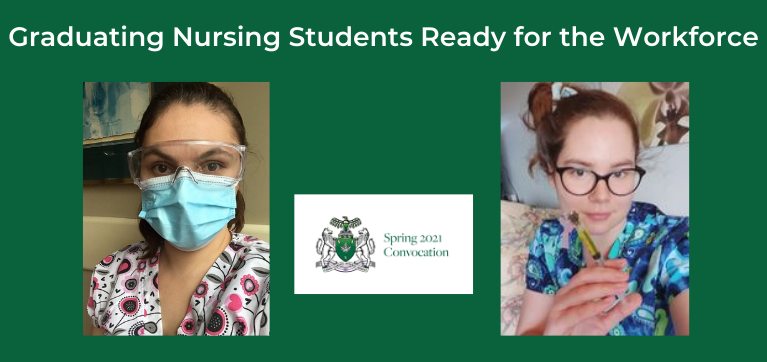Graduating Nursing Students Ready for the Workforce – An AC Profile
Posted on Tuesday, June 15th, 2021
 Meagan Mallory (photo, left) and Jadzia Bryson (right) knew they wanted to be nurses from an early age. Mallory made the decision as a child when her brother was sick with leukemia (he later recovered). For Bryson, her determination to enter the profession solidified when she began the program two years ago and realized nursing and helping people “was where I needed to be.”
Meagan Mallory (photo, left) and Jadzia Bryson (right) knew they wanted to be nurses from an early age. Mallory made the decision as a child when her brother was sick with leukemia (he later recovered). For Bryson, her determination to enter the profession solidified when she began the program two years ago and realized nursing and helping people “was where I needed to be.”
As the two young women, both 24 years of age, prepare for Spring Convocation on June 23, they took time to reflect on their studies and on entering the workforce during a pandemic.
Both said they were keen to work in the field of medicine, in part because of the “hands-on” nature of the work – something they lost temporarily when the global pandemic was declared in March 2020.
‘Within the first two months of the program, we were in the field (doing their student placement in a long-term care facility and in a hospital, respectively),” said Bryson. “When we switched online, we lost some in-person interaction and we lost connection to professors and the lab. To lose that in-person interaction was nerve-wracking.”
Bryson said instructors showed demos online when face-to-face instruction was halted. But at the end of term there were in-person labs that allowed for rotations at different stations to practise their new skills.
Mallory adds that during her placements, nurses on-site were “very willing to help us learn and willing to teach us,” which allowed them to continue learning despite the restrictions in force to prevent the spread of COVID-19.
The women are well aware of the conditions they will face as newly minted nurses. “I’m excited, but seeing how short-staffed some locations are and coming in knowing (about) all the stress – it’s a lot,” said Mallory. “(This is) especially the case in long-term care facilities.” Bryson shares her colleague’s anticipation. “It’s a really exciting time to go into the workforce,” she said. “It’s been a challenge to get through everything but it’s exciting to know that we are going to be a licensed nurse and once we receive the license, people’s lives will be in our hands. It’s so exciting to know there is a finish line. We’ll never be done studying in a way, but we are finishing a chapter.”
While they are disappointed their graduation ceremony will take place online rather than among their fellow graduates and in front of family and friends, Mallory and Bryson are still waiting to hear if they will be able to have a “pinning” ceremony, a ritual for nurses when they are accepted into the nursing community by their peers. The women say if the pinning ceremony is not allowed, they will be involved in delivering pins to all of their classmates.
Bryson adds that while there is much uncertainty, the support from the community at large and from patient families has been overwhelming. “It makes me feel like I’m going into an actual community,” she said. “Patients’ families will drop off food and we so appreciate it. We don’t always get our breaks. Knowing the community is supporting us and getting us something to eat makes us feel we are appreciated. It’s not the patients saying thank you, it’s the families.”
To learn more about Algonquin College’s convocation visit this page.
- Posted in
- News